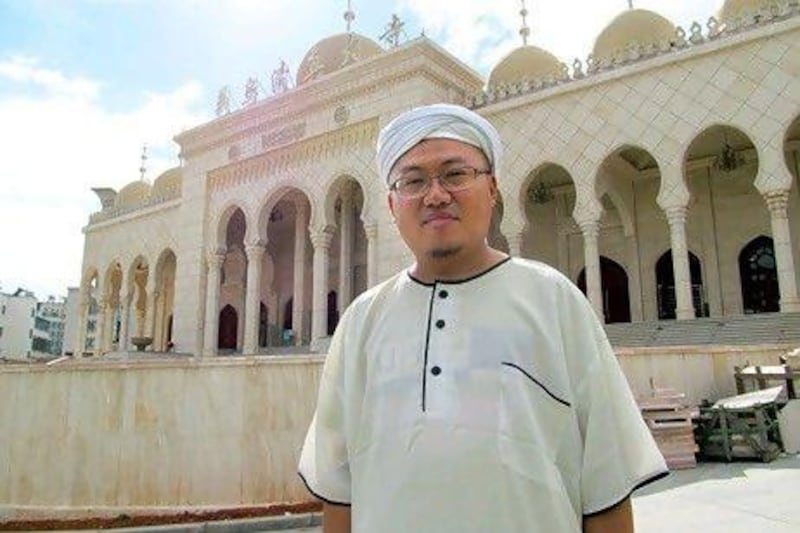YIWU, CHINA // Go back little more than a decade, and a group of Muslim residents in Yiwu, a city in eastern China, had to rent a hotel room so that they would have somewhere to pray.
As their numbers increased from about 100, they moved to a rented car park - but soon they had outgrown that, too, and worshippers spilt into the nearby street.
Today, the finishing touches are being put on a 25 million yuan (Dh14.4 million) mosque that is already being used by Yiwu's Chinese, Arab and South Asian Muslim residents and visitors.
Yet despite the construction of the mosque, one thing has not changed. Such has been the growth of the city's Muslim population that at busy periods, there is still not enough room for everyone inside and some worshippers have to find space outside to pray.
"It is really spectacular," the mosque's imam, Aisin-Gioro Baoquan, said of the increase in the number of Yiwu's Muslims.
He said the city "undoubtedly" has the fastest-growing Muslim community in China.
There are an estimated 35,000 Muslims in Yiwu, almost one-third of whom can be found at the mosque during its busiest periods. About half the city's Muslims are thought to be from overseas, with many from Arab countries.
Yiwu's markets, which sell goods made in China's factories, are said to be the largest in the world and it is these markets that, over the last decade, have attracted growing numbers of Arab and South Asian traders who buy items to ship abroad.
This, in turn, has drawn in Chinese Muslims, mostly Hui people and members of the Turkic Uighur minority, to work in restaurants and as store assistants or interpreters, turning this city south-west of Shanghai into a key centre for Islam in eastern China.
"It's an organic blend between commerce and religious life. It's quite unique," said Mr Aisin-Gioro, a member of China's Manchu minority.
Many of the first of the modern wave of traders to arrive in Yiwu in the early 2000s worshipped with Mr Aisin-Gioro in the rented hotel room. By 2004, and several moves later, the Muslim population had grown to the extent that the local authorities gave the community a former silk factory to worship in.
Muslims from at least 20 countries prayed there.
Five years later, work began to rebuild the factory-turned-place of worship into the new mosque, funded by donations from Muslims from overseas and within the city.
Made with marble imported from Iran and with an Arabian-style external design and Central Asian influences inside, the mosque is almost complete except for some external work on the minaret due to be finished within weeks.
At busy times, the local authorities, who residents praise for welcoming Muslims, close off the nearby road to allow extra space for prayers.
While Guangzhou in southern China has more Muslims, Yiwu's smaller size means there is "a stronger sense of a Muslim community", according to Li Zihong, 41, a Hui Muslim restaurant owner and vice chairman of Yiwu Islamic Committee. In the early 2000s, he said Yiwu had just one Muslim restaurant; now there are 36.
"Now we have such a magnificent mosque, the community is anchored. It gives us a sense of belonging," he said.
Many non-Muslims are glad to see the influx of Muslims from overseas and other parts of China, as their arrival has spurred economic growth.
"It's definitely a good thing," Wu Donglian, 49, a supermarket owner born in the city. "They have improved the city's economy a lot. Today Yiwu is several times the size it used to be. It's expanded very quickly."
Zhejiang province, which contains Yiwu, is "very open", according to Wu Dengqui, a salesperson for a packaging company in the city. It has, he said, long welcomed a diverse group of people thanks to its role as a trading hub.
"I have met people of all races, of all nationalities. I think most people share my view. They are quite tolerant," he said.
While unrest in the Middle East has affected trade with some Arab countries over the past two years, residents report that, after the end of the large-scale turmoil in Libya, for example, that country's citizens flocked to Yiwu to buy goods and capitalise on growing commercial opportunities at home. This gives residents hope the Muslim community will continue to expand.
"I am pretty sure this Muslim community will grow further, because every year you see new faces. It changes every year and it gets bigger," said Mr Aisin-Gioro.






